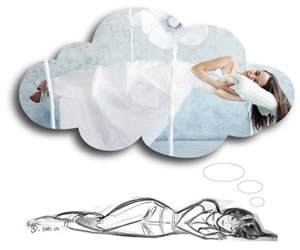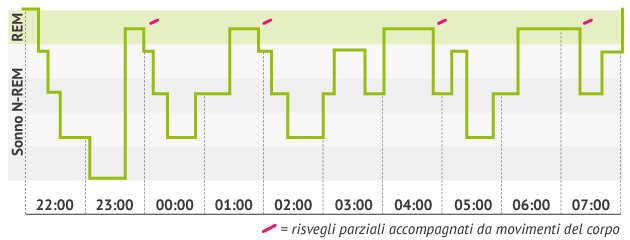
Have you ever wondered what happens when we fall asleep and abandon the awaking state?
In dreams, everything is possible...
...eating many pounds of chocolate and have the same body of Naomi Campbell.
...throwing a pie to your boss’ face without suffering consequences.
...escaping with an Australian surfer on a horse.
...stopping time to adjust or change something.
...flying.
Oh dear, too bad that these are all just dreams because when you wake up everything is as it was before.
Every night in our dreams, prehistory is mixed up with fiction, the logic with the inconsistency to create unreal stories that can make us feel real feelings like happiness, sadness, fear, anxiety, euphoria. They may include either people who we know or complete strangers, familiar places or places we have never seen before. Sometimes they just remember us events that happened during the day. Other times they might also revoke our darkest secrets, fears and our most intimate fantasies.
When do we dream?
Until a few years ago, it was believed that dreams do not accompany us all night but show up only during the sleep stage known as rem. To resize this concept, several studies have shown that the other phases of our night's sleep (non-rem sleep / nrem) host dreams. The rem is the closest phase to the awakening, this is the reason why it is more likely to remember the dreams in the than in the nrem phase. At each sleep stage correspond different dreams. During the rem stage, for example, people usually report that they have interacted with 2-3 characters, usually with people they already know in real life. The nrem stage can accommodate more people, even strangers like in a movie.

What happens to our bodies while we are dreaming?
During this process, the brain is activated almost in all its entirety, and needs to double the blood flow more than when it is awakened. Only one part of the brain stops working when we are asleep: the logic zone. This is why many times dreams acquire surreal shades. Also, to avoid to externalize what we dream, the brain sends signals to the spinal cord, paralyzing temporarily our limbs. The only thing that we move when we are dreaming, during the rem phase, are the eyes, which move in a consistent manner in concord with what we are doing in the dream. So much so that if we are dreaming of attending a tennis match, our eyes, under the eyelids, move from left to right as they would in reality.
Why do we dream?
Dreams have fascinated philosophers for thousands of years. Many theories have been proposed on the reason why this brain activity happens, however, there is not a full consensus in any of them. An obvious fact is that the explanation of our dreams is still mysterious. But this has not stopped scientists from making some assumptions rather fascinating:
• To fulfill the wishes, as Freud says. Any dream, no matter how terrifying it is, it can be seen as a way to get something you want, literally or symbolically.
• To solve problems,as Barret affirms (Harvard University psychologist). "One of the purposes of dreams may be to help us find creative answers to the difficulties that torment us during waking hours."
 And is it possible to resume an interrupted dream?
And is it possible to resume an interrupted dream?
Yes, if this happens during the rem phase. Dreams that are so-called "series" have to do with short nighttime awakenings.
For example, we are chased by a disturbing character and all of a sudden, we wake up frightened (or due to an external factor, like a sudden noise), then reassured, we fall asleep again continuing the dream where it had been left off.
As studies on sleep physiology show, the possibility of resuming a dream corresponds to the fact that if it fails during the REM phase, almost certainly, sleep will be recovered and the interrupted cycle dream will be completed.

Curiosity!
- 1. The 12% of people dream in black and white
- 2. The 90% of the details that make our dreams are forgotten in the first minute after getting up
- 3. The colder the house is, the more macabre the dreams will be.
- 4. During all night, the most of us dream every 90 minutes.
- 5. If we dream, we can not simultaneously snore.
...now it is time to take a nap! Good night!
